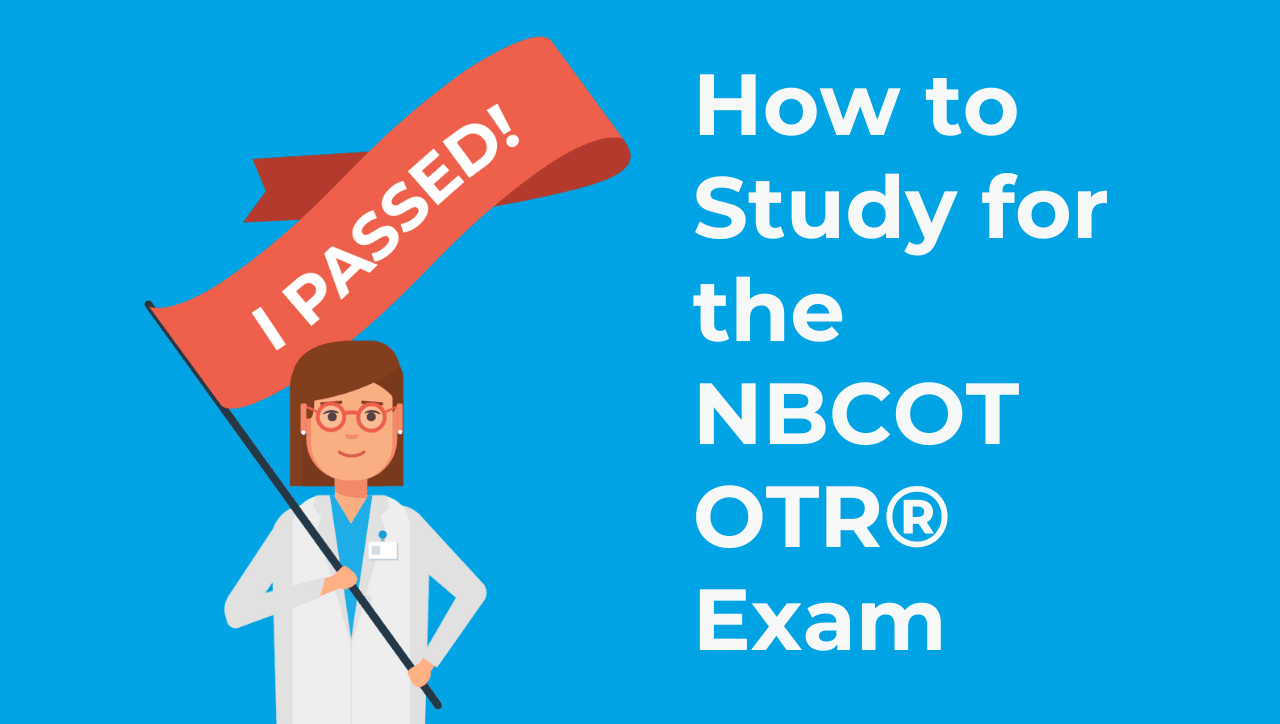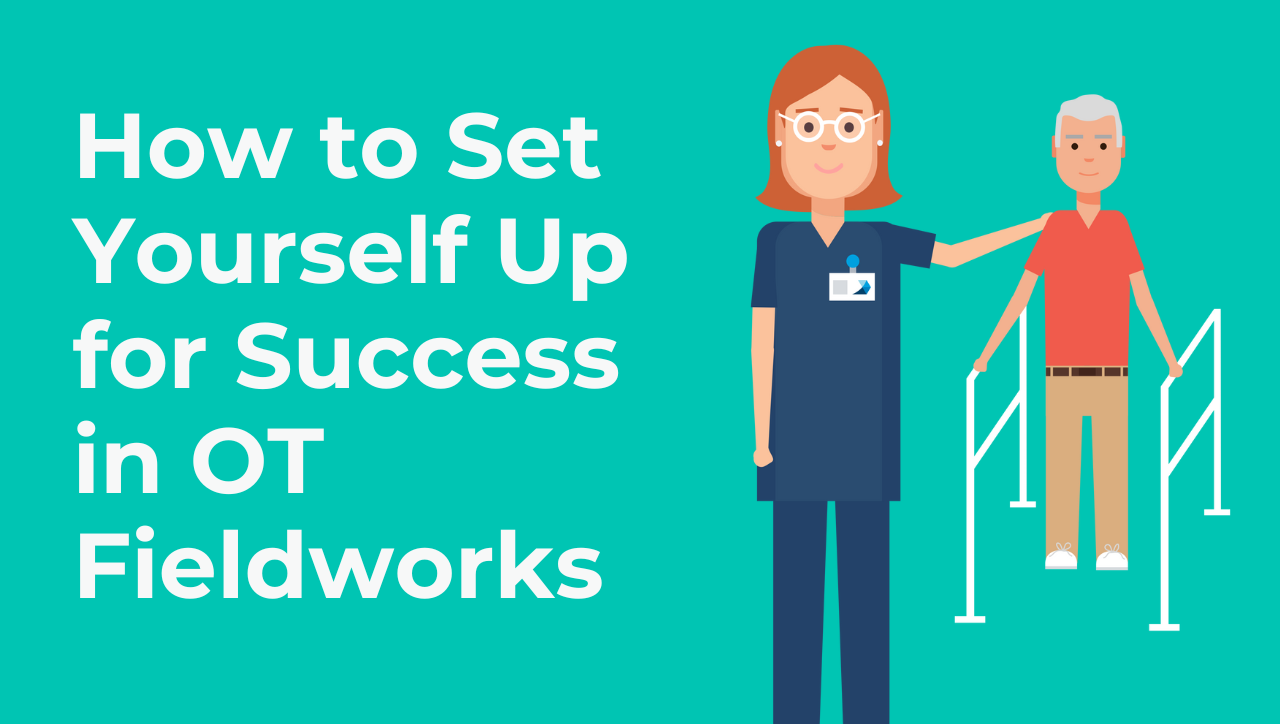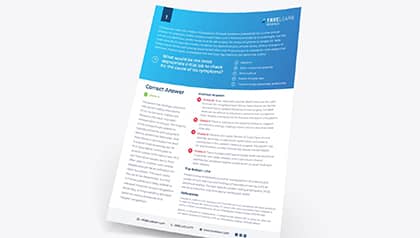How to Pass the NBCOT OTR® on Your First Try
When preparing for the NBCOT® Exam, you might be the type of person who thinks “no problem, I’ll study a little each evening during fieldwork” with the intent to be ready to take the exam right after graduation. As with many other similar things, this plan didn’t work. Fieldwork is exhausting and requires all your bandwidth, leaving none left for studying. So how do you pass the NBCOT with no time or energy?
You need a plan and accountability to execute the plan. Yes, it’s an overwhelming exam and it feels like there’s a lot riding on it. This is ultimately the culmination of the many hours spent in lectures, labs, working in groups with your fellow students, putting together projects, and managing clinical rotations. In order to be successful, let’s breakdown what you need to do, step by step.
Step 1: Take a practice test cold
Yes, don’t study. Just sit down and answer the 170 multiple choice questions over a four-hour time period. You don’t know what you don’t know. You also don’t know if you can focus for the duration of the exam (or sit in the same chair for that long).
You’re going to learn the answers to both of those questions shortly. And this is going to help you figure out what you don’t know. Study your wrong answers, identify areas you need to focus on, and get realistic about how long the exam is. That’s where you start studying and work on test-taking endurance.
Step 2: Find your resources
There are a lot of options for resources when studying for the NBCOT® exam. Consider how you learn best and opt for a couple resources to give you enough variability.
Here are some favorites:
- Flashcards: Self-made flashcards to encourage me to read the material again and write it down (multi-sensory learning!) Flash cards help me memorize the information. Things like anatomy, developmental ages, pediatric reflexes, etc, are easy to learn using the flashcards and rote memorization.
- Topic reviews: These consolidate your information into easy to read and understand sections. The topic reviews in the Therapy Ed National Occupational Therapy Certification Exam Review and Study Guide can be very helpful. They help place information from flashcards into context.
- Practice questions: Yes, you may have the information memorized; however, application of the information is key. The exam isn’t testing your rote memorization but rather your ability to use the information clinically and functionally. Application is essential to success with this test. Truelearn has over 1,300 occupational therapy practice questions available that are all mapped to the NBCOT® exam content, and recently added scenario-based items to the SmartBank. All the questions provide in-depth, detailed explanations regarding why or why not an answer is correct and all questions have a reference. The reference allows you to go look up the information if you need more details.
- Visual learning. Using visual learning devices, like interactive mnemonic videos, can help with your recall. Picmonics are quick and effective two-minute videos that help connect difficult to learn facts and add context to the information provided.
Step 3: Make a Realistic Study Schedule
Be realistic in how much time you’re willing or able to spend. Some get overly ambitious and commit 6-8 hours a day over the course of 4 weeks. Although that might feel like the right thing to do, the reality might be that such a schedule could burn you out. Maybe you’re the kind of person who needs to break your study sessions into 3–4-hour blocks, after all the exam itself allows you four hours maximum to complete. Building testing (and sitting) endurance to 4 hours will help you on test day.
Once you have found your resources, create a schedule with topics to study, when to take practice tests or check progress, when you will schedule the exam, and the date when you’re taking the exam.
When creating the schedule, focus your studying on the areas of weakness first. Use your resources wisely and spend extra time reviewing the tough areas. Creating a specific schedule can help keep you on track. For example, take one topic, prepare your flashcards, work with the topic reviews, and then take TrueLearn practice questions to ensure the information was sticking. With a more detailed and specific schedule, you’ll also create daily / weekly goals to attain while preparing for the final date.
Schedule Weekly Practice Tests
Each week, maybe every Friday, take a practice test, using either TrueLearn questions or the tests in the Therapy Ed National Occupational Therapy Certification Exam Review and Study Guide. Taking regular tests allows you to compare your scores from the previous week. Look to see if your weak areas get better and then see where you need to focus efforts for the following week. (TrueLearn is helpful in measuring progress as well by providing performance analytics and national benchmarking.)
Step 4: Register for the NBCOT
Part of your schedule should include scheduling the exam. This feels like a big step and should be done a few weeks after you’ve started studying. Committing to the actual date and time of your test is a big deal and announces, “I’m ready!” Hopefully after studying for a few weeks, you’ve identified your patterns- days of the week and time of day where you’re at your best. Are you “brainier” in the mornings and generally better at the beginning of the week? Or are you an afternoon, middle-of-the-week person? Give yourself the advantage where you can.
Advice for the Day Before
Go over those things that aren’t sticking well. Especially on the day before the exam, go back and visit the Picmonics to help with the information. Review more questions, but also focus on your health and mental well-being. Eat well, hydrate, get quality rest and connect with your daily activities that center you, bring you joy, and offer a distraction. Also don’t forget to pack the things you need for the test. Locate anything you are taking with you and have it ready to go (including your wallet, phone, and those pesky car keys).
Advice for Exam Day
Eat healthy meals, hydrate, and know you’ve done all the work you’ve needed to do. When you sit down to take the exam, take a moment to write (on the board or paper provided at the testing center) anything that’s been hard to learn or remember. It feels good to do a data dump before settling into the exam. You’ll have that data ready for when you need it.
NBCOT Pass Rates
In 2024, an average 68% of OTRs and 68% of COTAs passed on the NBCOT® on their first try within one year of their graduation date. The NBCOT® exam’s entire purpose is to encourage a baseline standard of practice for all new professionals. The NBCOT® exam presents itself as an overwhelming feat; however, with proper, dedicated studying and preparation, this exam is passable. Use your resources, create a schedule and stick to it, and you too can pass the NBCOT on your first try.


